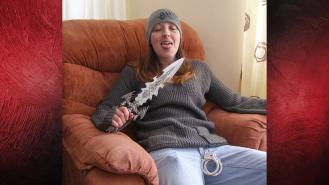
Joanna Dennehy: The female killer with male accomplices
Over the course of a few weeks in 2013, a 30-year-old woman named Joanna Dennehy murdered three men she knew in Cambridgeshire. She then went on to stab two others completely at random in Hereford. Her protracted frenzy led to her becoming only the third British woman to receive a whole life sentence, after Myra Hindley and Rose West.
All three women had male partners in crime, but in Dennehy’s case there was a significant and unprecedented difference. While the responsibility for Hindley and West’s crimes was shared with their even more depraved partners, Ian Brady and Fred West, Dennehy was the sole mastermind of her stabbing spree, doing it purely for her sadistic pleasure. Her three accomplices were relegated to the role of willing assistants.
Dennehy committed her three murders with no help whatsoever, first killing her friend Lukasz Slaboszewski, then landlord Kevin Lee and housemate John Chapman 10 days later. After the second killing, Dennehy rang another friend, Gary Stretch, and sang the Britney Spears lyrics “Oops, I did it again” down the phone. Stretch was familiar with Dennehy’s bloodlust by that point, having already helped her dispose of Slaboszewski’s corpse.
Stretch was a looming giant of a man. According to one mutual friend, he would “follow Dennehy around as if he was a puppy and she his master”. Stretch helped to clean up the latter two murders as well, along with another acquaintance named Leslie Layton. A third man, Robert Moore, was also eventually convicted of providing Dennehy with somewhere to stay while on the run.
However, it was Stretch who was the most active participant in the killing spree. He drove her around Hereford as she looked for more victims, dutifully stopping the car so she could jump out and stab two random passers-by. Fortunately, both men in this instance survived, but such was Stretch’s role in the attacks that he was later convicted of attempted murder.
Dennehy’s possible motives have been much debated. It’s well known that she had issues with alcohol and drug abuse and had a reputation for terrifying mood swings. However, none of this can really explain the joy she obtained from violence and murder.
Utterly unfazed by her own acts and their consequences, she cheerfully flirted with the police officers who eventually arrested her. Later, in letters to her prison lover, she described herself as a “psychopath”
This clear ability to dramatize and romanticise her own macabre personality probably contributed to an air of dark charisma that drew men to her. One of her victims – her landlord and lover Kevin Lee – told a friend that Dennehy wanted to “dress me up and rape me”, yet he still willingly returned to her clutches and paid for it with his life. Stretch, meanwhile, played the role of Clyde to her Bonnie, in a female-led string of violence that was almost unimaginable before Dennehy’s onslaught unfolded.
Commenting on Dennehy, criminologist David Wilson explained: “The psychology behind this relationship is called a ‘folie a deux’ or ‘a madness shared by two’… What’s unusual in Dennehy’s case is that she’s the dominant one and men are doing her bidding.”
The Dennehy case may perhaps be considered a rare, female-focused example of ‘Bonnie and Clyde Syndrome’. Technically known as ‘hybristophelia’, this is a sexual interest in those who commit crimes, which is a well-documented phenomenon.
Serial killers from Ted Bundy to Richard Ramirez were famously flooded with fan mail by females in prison, while numerous online fan sites have sprung up around figures like Columbine killers Eric Harris and Dylan Klebold, and cinema shooter James Holmes.
Several potential reasons have been offered for hybristophelia. The love-struck female fans of monstrous murderers may, for example, be lacking a figure of authority in their lives, or they may be attracted by the idea of “fixing” a flawed man. The often-controversial field of evolutionary psychology offers its own reading: that killers are somehow subconsciously viewed by their fans as the ultimate “alpha males” whose capacity for violence means that they can be counted on for protection.
It’s difficult to see how any of these explanations may apply in the Dennehy case. Certainly, the idea that Gary Stretch – a 7ft3 veteran burglar in his late 40s – regarded Dennehy as an “authority figure” strains credulity. Little by way of explanation was offered during the trial; Dennehy was described as having “cast a spell” over her male accomplices, Stretch was described as “luxuriating in the notoriety” of being connected with Dennehy, while the judge suggested that Moore was simply “besotted” with Dennehy.
Whatever the reasons, Joanna Dennehy – the once-ordinary woman who killed because it was “moreish” – will always be remembered not just for the savagery of her crimes, but for engineering a female-led dynamic that baffled and horrified in equal measure.








